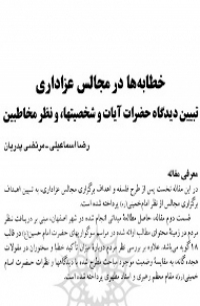
خطابه ها در مجالس عزاداری (تبیین دیدگاه حضرات آیات و شخصیت ها و نظر مخاطبین)
منابع مشابه بیشتر ...
پیشینه تاریخی برگزاری مراسم روز عاشورا در جوامع شیعی
احمد خامه یاردرباره زمان پیدایش و شکلگیری مراسم روز عاشورا در میان جوامع شیعی، با استناد به گزارشهای مورخان معتبر عراقی همچون ابن جوزی (المنتظم، ج۱۴، ص۱۵۰) و ابن اثیر (الکامل فی التاریخ، ج۸، ص۵۴۹) مبنی بر عزاداریهای شیعیان بغداد در روز عاشورا که در زمان معزّالدوله دیلمی (حکومت: ۳۳۴-۳۵۸ق) از سال ۳۵۲ق آغاز شد و در سالهای بعد نیز ادامه یافت، دیدگاهی که میان بسیاری از اسلامشناسان و پژوهشگران تاریخ تشیع، از جمله علیاصغر فقیهی (تاریخ آلبویه، ص۳۰)، هاینس هالم (شیعه، ص۶۱)، حمزة الحسن (طقوس التشیّع، ص۴۴۰) و دیگران رواج یافته، آن است که این عزاداریها، نخستین مراسمهای رسمی و عمومی روز عاشورا در میان جوامع شیعی بوده و در واقع آلبویه نخستین حکومتی بودهاند که برپایی چنین مراسمی را حمایت کرده و به ترویج آن پرداختهاند. چنانکه گزارشهای همان مورخان، حاکی از برپایی مراسم جشن و سرور روز غدیر پیش از مراسم سوگواری روز عاشورا، یعنی به فاصله زمانی کمتر از یک ماه از آن بوده است.
The concept of political legitimacy in shia political thought (with focus on imam khomeini`s political thought)
Azam boroughaniLegitimacy is always considered an important concept among basic topics of political science; since it has been already posed as the prerequisite of acceptability for exercising of power in the societies through history. Accordingly, all of the political philosophies made efforts to establish an intellectual apparatus that enforces the fundamentals of governance, dealt to some extent with the issue of “Legitimacy” and included it in the core of arguments. In general, legitimacy would be defined as being legal or to be based on the law; but it refers not only to legality of government from the legislative respect, but also to social acceptability of it by citizens. In this article, we try to study and investigate the political legitimacy in the Shia political thought, particularly with focus on views of Imam Khomeini (RA) as the founder and former leader of Islamic Republic of Iran.
- عناوین
- موضوع ها
